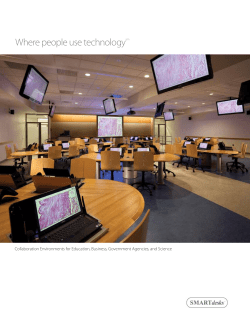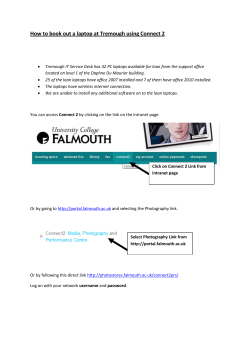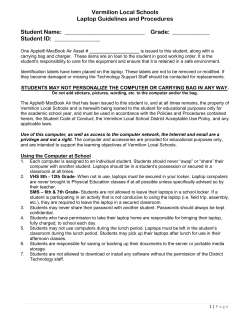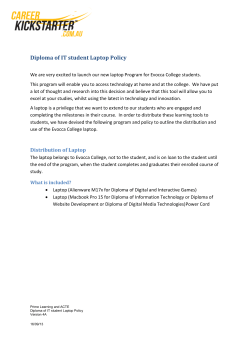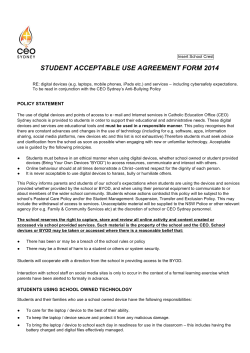
LAPTOP USE IN CLASSROOMS The Arguments
LAPTOP USE IN CLASSROOMS The Arguments For Laptops: • Laptops allow for increased ease and speed of note-taking and engagement with online sources related to the course material • Laptops can also be used to facilitate faculty-student interaction and increase rates of in-class participation and student motivation The Evidence Against Laptops: • In a controlled study (Hembrooke & Gay 2003), students with open laptops remembered less lecture content than those with closed laptops • Surprisingly, students who spent a greater proportion of time seeking course-related sites recalled significantly less than those who were more often browsing sites unrelated to the course (r = -.516, p. < .02) • In another study (Fried 2008), the more students used their laptops, the lower their class performance (β = -.179, t(115) = -2.286, p = .024), the less attention they paid to lectures (p = .049), the less clear lectures seemed to them (p = .049), and the less they felt they understood the course material (p = .024) The Arguments Against Laptops: • Online content is more stimulating than traditional classroom distracters (e.g., passing notes or talking), and interferes even more with students ability to learn material • Students actively seeking course-related material show a surprisingly decreased ability to balance their attention between the lecture content and their focused searching In lecture-style classes where computers are not essential to the material, the sustained use of laptops during lecture is potentially so distracting as to hinder a student’s performance and distract their fellow students. Sustained laptop use is not recommended, although some evidence suggests that brief, occasional browsing sessions are not as likely to hamper learning. Sources Cited: Carrie B. Fried. 2008. In-class laptop use and its effects on student learning. Computers & Education. Vol. 50(3): 906-914. Abstract: Recently, a debate has begun over whether in-class laptops aid or hinder learning. While some research demonstrates that laptops can be an important learning tool, anecdotal evidence suggests more and more faculty are banning laptops from their classrooms because of perceptions that they distract students and detract from learning. The current research examines the nature of in-class laptop use in a large lecture course and how that use is related to student learning. Students completed weekly surveys of attendance, laptop use, and aspects of the classroom environment. Results showed that students who used laptops in class spent considerable time multitasking and that the laptop use posed a significant distraction to both users and fellow students. Most importantly, the level of laptop use was negatively related to several measures of student learning, including self-reported understanding of course material and overall course performance. The practical implications of these findings are discussed. Helene Hembrooke and Geri Gay. 2003. The Laptop and the Lecture: The Effects of Multitasking in Learning Environments. Journal of Computing in Higher Education. Vol. 15(1) Abstract: The effects of multitasking in the classroom were investigated in students in an upper level Communications course. Two groups of students heard the same exact lecture and tested immediately following the lecture. One group of students was allowed to use their laptops to engage in browsing, search, and/or social computing behaviors during the lecture. Students in the second condition were asked to keep their laptops closed for the duration of the lecture. Students in the open laptop condition suffered decrements on traditional measures of memory for lecture content. A second experiment replicated the results of the first. Data were further analyzed by “browsing style.” Results are discussed from Lang’s Limited Process Capacity model in an attempt to better understand the mechanisms involved in the decrement. “Even proponents of laptops have argued that the use needs to be carefully controlled.” -- Fried, 2008:906
© Copyright 2025



